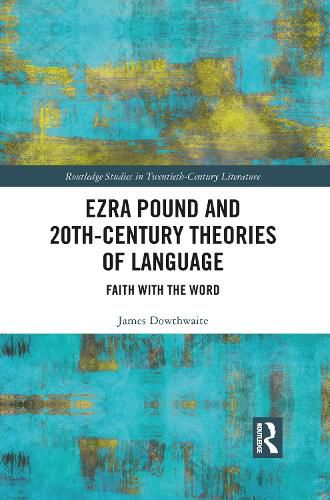Readings Newsletter
Become a Readings Member to make your shopping experience even easier.
Sign in or sign up for free!
You’re not far away from qualifying for FREE standard shipping within Australia
You’ve qualified for FREE standard shipping within Australia
The cart is loading…






Ezra Pound is one of the most significant poets of the twentieth century, a writer whose poetry is particularly notable for the intensity of its linguistic qualities. Indeed, from the principles of Imagism to the polyphony of his Cantos, Pound is central to our conception of modernism’s relationship with language. This volume explores the development of Pound’s understanding of language in the context of twentieth-century linguistics and the philosophy of language. It draws on largely unpublished archival material in order to provide a broadly chronological account of the development of Pound’s views and their relation to both his own poetry and to modernist writing as a whole. Beginning with Pound’s contentious relationship with philology and his antagonism towards academia, the book traces continuities and shifts across Pound’s career, culminating in a discussion of the centrality of language to the conception of his Cantos. While it contains discussions around significant figures in twentieth-century linguistic thought, such as Ferdinand de Saussure and Ludwig Wittgenstein, the book attempts to recover the work of theorists such as Leonard Bloomfield, Lucien Levy-Bruhl, and C.K. Ogden, figures who were once central to modernism, but who have largely been pushed to the periphery of modernist studies. The picture of Pound that emerges is a figure whose understanding of language is not only bound up with modernist approaches to anthropology, politics, and philosophy, but which calls for a new understanding of modernism’s relationship to each.
$9.00 standard shipping within Australia
FREE standard shipping within Australia for orders over $100.00
Express & International shipping calculated at checkout
Ezra Pound is one of the most significant poets of the twentieth century, a writer whose poetry is particularly notable for the intensity of its linguistic qualities. Indeed, from the principles of Imagism to the polyphony of his Cantos, Pound is central to our conception of modernism’s relationship with language. This volume explores the development of Pound’s understanding of language in the context of twentieth-century linguistics and the philosophy of language. It draws on largely unpublished archival material in order to provide a broadly chronological account of the development of Pound’s views and their relation to both his own poetry and to modernist writing as a whole. Beginning with Pound’s contentious relationship with philology and his antagonism towards academia, the book traces continuities and shifts across Pound’s career, culminating in a discussion of the centrality of language to the conception of his Cantos. While it contains discussions around significant figures in twentieth-century linguistic thought, such as Ferdinand de Saussure and Ludwig Wittgenstein, the book attempts to recover the work of theorists such as Leonard Bloomfield, Lucien Levy-Bruhl, and C.K. Ogden, figures who were once central to modernism, but who have largely been pushed to the periphery of modernist studies. The picture of Pound that emerges is a figure whose understanding of language is not only bound up with modernist approaches to anthropology, politics, and philosophy, but which calls for a new understanding of modernism’s relationship to each.